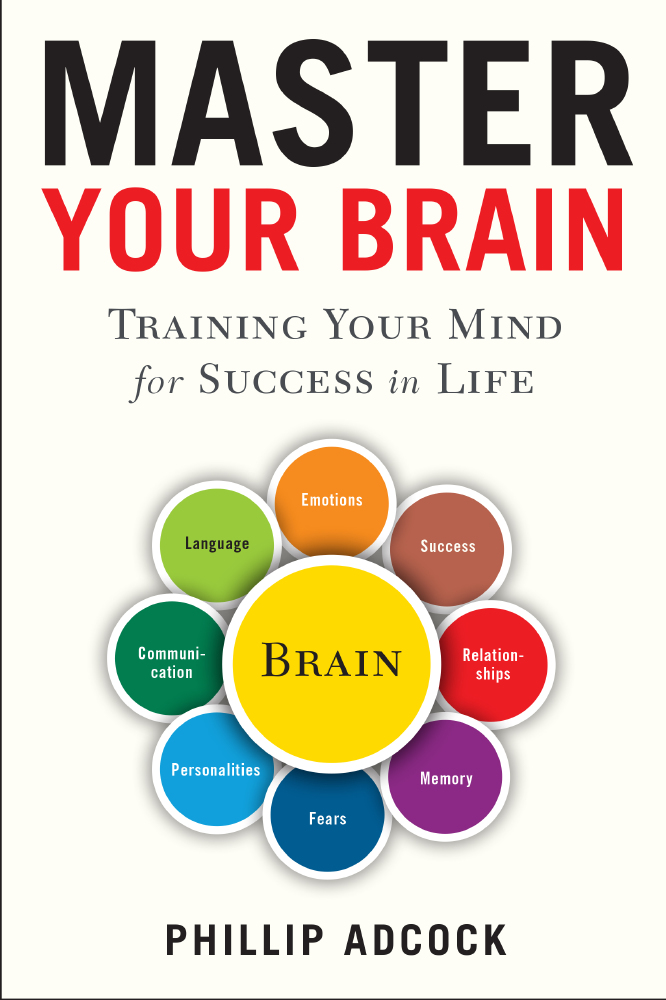Psychologist and behaviour expert Phillip Adcock on how you can harness your grey matter to create a successful life

Phillip Adcock
Brains -- we all have one, but how much do we really know about them? They’re at the centre of nearly all human activity, but to be able to get the most out of them, we need to know what they are and how they function. It's also important from an achievement perspective to find out more about the core strengths and weaknesses of the human brain.
While the ancestral brain system has been evolving for hundreds of millions of years, cognitive reasoning is a very modern invention, having evolved as recently as 1.5 million years ago. What this tells us is that the part of our brain that allegedly makes us more intelligent than the animals with which we share this planet has been operating for only a fraction of the time that our brains have been evolving.
This ‘intelligent’ part of our brains is unable to compete with the much older, more established, and more evolved animal part. In other words, almost every meaningful decision any one of us makes is based almost entirely on the thought process used by the rest of the animal kingdom (instinct). The aim of this entire instinctual process is to preserve life and health, and these very same instincts are what manage and control many human thought processes (depressing though that may be!).
So now you understand a little bit more about how your brain works, let’s look at five easy to use ways that you can harness it to reach your full potential.
Be positive
One of the best pieces of advice I ever heard is this: stop focussing on what you don't want to happen and devote all your attention on what you do want instead.
Our brains are constantly forced to deal with more than they can handle comfortably. As a consequence, they must filter out a lot in order to make sense of anything at all. Take language, for example. We often make sense of letters on a page by reading only a few of them. And when we listen to others, we tend to pay more attention to some words than to others -- we pay more attention to concrete words (particularly nouns), such as dog, cat, road, and tree, than we do to less solid words, such as very, not, and don't.
Science tells us that right-brain thinking (emotional) is more powerful than left-brain rationality (logic and reason). That combined with the fact that we filter so much information leads to the conclusion that we process the world around us more emotionally than rationally -- and we do so with a positive bias.
This comes into play quite dramatically in people who seem to approach life always negatively. When someone thinks, "I'll never find my ideal partner,” the brain filters out the softer words and concentrates on the more concrete words. What’s left equates to "Never find partner.”
If you find yourself falling into that trap, you need to snap out of it, literally! Break the chain and start thinking in a more success-oriented way. One way to do so is to write down what it is you’re thinking and how you’re thinking it. Then highlight each of the concrete words to see what message you’re really sending to your brain. If the dialogue is wrong or incongruous with your desire for achievement, don’t change what you say, but rather the way you say it. In other words, spin it another way.
When you give your brain the right set of instructions and the correct motivation and emotional leverage to achieve something, it never ceases to amaze just how effectively it can bring about the success you want in life.
Entrench good habits
Any habits you have, whether ‘good’ or ‘bad’, are formed through frequent repetition of a thought process and behaviour set. They tend to be triggered by a single stimulus, either mental or physical. For example, the thought of the dentist can cause a nail biter to bite his nails.
Many of our habits are developed during our formative years, most often as a result of “learning” from our parents. We learned them by way of observation and modelling. As we learn a new habit, we create a specific neural pathway to carry it out. The more we conduct this habitual behaviour set, the stronger the neural pathway becomes. At the same time that the pathway is becoming embedded, our brains develop a trigger that will lead to the automatic execution of this behaviour. The result is that all it takes to cause us to carry out a habit is to pull the right sensory trigger.
If you want to adopt a good habit, such as a healthy diet or exercising regularly, you need to first learn it and then wire it as a neural pathway in your brain. Begin by making it part of your routine, then invent triggers that remind you to carry it out. In the beginning, the trigger may be sticky notes on your desk or simple reminders on your smartphone. In essence, what you’re doing is rehearsing a behaviour set that you want to learn.
At first, you’ll have to make a conscious effort to do so. In time, depending upon the leverage you give yourself, it will become automatic. By leverage I mean the emotional reasons behind why you want to adopt the new habit. What are the motives you have repeatedly told your brain to respond to? It's best to write out a list of reasons. Read them to yourself or tape-record them. Considering how fallible our brains are, it's wise to give them all the help we can to assure success.
Challenge your belief system
Your belief system is the set of ideals that govern your thoughts, words and actions. As humans we are born into this world without any pre-existing knowledge about the society we are entering. In order to cope and survive, we must make observations and draw conclusions from them.
Often, it’s a belief system that restricts your progress. You may have a number of negative beliefs: you’ll never find true love, or you don’t deserve to be successful. But the important thing about belief systems is that whatever we learn in life can be unlearned. When we try to rise above the impulsive thoughts and automatic urges that make up our belief systems, we can succeed.
To change beliefs you must first recognise when they are damaging. Then you must, must, must take some action to change them. If you don't, they'll continue to sit within your skull, limiting you at every turn.
You need to therefore believe that change is achievable. That will take some action on your part; so, if you want to change, do something and do it fast! Whatever you believe is beyond you, ask yourself, why? Whatever you want but haven't got, demand an explanation from your brain as to why and what's taking so long! Finally, get hold of any negative and limiting beliefs by the scruff of the neck and turn them into something more positive and motivational.
Think and therefore be
Your body influences thought and that thought influences the body. In other words, psychology and physiology work together in tandem resulting in who we are and how we function. You can therefore use this combination of your brain and body to increase your personal achievement.
The conduit that links the brain and body has to do with emotion. Emotion and feelings are a combination of psychological and physiological states. Ask someone to start thinking that he’s depressed and observe his physiology. His head will drop, his shoulders will droop, and the corners of his mouth will turn down. That’s because the he body and brain work together to generate an overall state of depression. Once we accept the premise that emotions come from the combined efforts of the two, we can apply that concept to our personal achievement strategies.
One tool to do this is by using hypnosis -- and I don’t mean the stage show entertainment version. The human brain consists of a small relatively limited conscious, along with a much more powerful subconscious. The conscious is the part that makes sense of things around us, and the subconscious is everything else! It controls all the autonomic processes that you don't have to think about before doing, such as increasing heart flow to the muscles. It's where our thoughts, memories, and accumulated experiences reside. It also controls our emotions, habits and responses to the world around us.
At times when the conscious mind can't manage all that is required to make sense of something, the subconscious jumps in to help out. When the subconscious is making sense of a conscious problem, then both parts of the brain are working together, finding the solution. Most importantly, during such times, channels of communication open to the subconscious mind -- channels not being vetted by the more reasonable conscious mind. In effect, hypnosis works by bypassing the critical conscious mind and speaking directly to the subconscious. It updates the subconscious mind with new and more helpful information, similar to reprogramming a computer while bypassing a firewall. It’s a powerful tool.
Write your own script of what you want to change in your life, and then record it. Whenever you want to relax, play your recording and listen to your own voice telling you what you want to change. The result is that your mind hears you instructing your subconscious as to the changes you want it to make. It’s a sure-fire way to more personal achievement -- a fast-track tool you can use to rewire your brain for success.
Set the right type of goals
A goal is the end result of an expended effort. Notice the critical words, end and result. Simply wishing for loads of money is a flawed goal, since money isn’t the end result so much as it is the means toward any number of end results. The actual goal may be to give up work and spend more time at home.
As such, it’s difficult (if not impossible) for your brain to become sufficiently emotional about money to the point where it sets off in search of acquiring it. This is a good example of how we can misinterpret our goals and, in turn, misdirect our brains to go after the wrong dream.
When setting goals, we need to think them through carefully. We want to help our brains fully understand what we're seeking. You need to envision a personal or organisational endpoint in some sort of assumed development. Make sure your goals are emotionally meaningful to you. In that way, you can get more parts of your mind working to help achieve them.
These are just some of the ways that you can master the power of your brain to reach your full potential. The most important thing to remember is: if you want something, then have to need it. It's not good enough merely to desire it. Your brain has to recognise that success is an imperative. So, what are you waiting for?

Phillip Adcock is a commercial psychologist and author of Master Your Brain: Training your Mind for Success in Life. Available now on Amazon.

